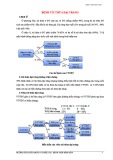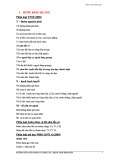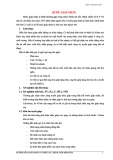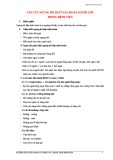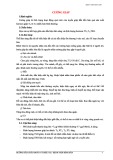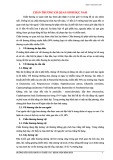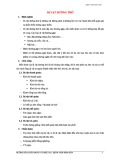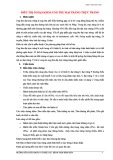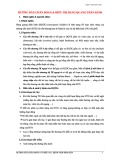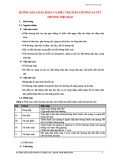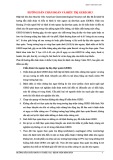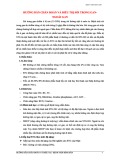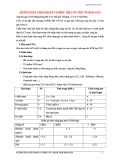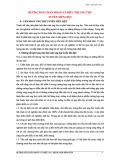Phản ứng phụ của thuốc kháng sinh
Hầu hết tất cả các thuốc khi áp dụng trị liệu đều không nhiều thì ít có
những phản ứng phụ có thể gây tổn hại đến nhiều cơ quan trong cơ thể, và
nhất là tâm thần-thần kinh.
Bài viết ngắn này chỉ nói đến những phản ứng phụ của thuốc kháng
sinh gây hại đến thần kinh đã được biết đến qua những nghiên cứu thử
nghiệm khi còn đang trong giai đoạn xét nghiệm hay là sau khi thuốc đã lưu
hành trên thị truờng và được tường trình đến giới chức y tế liên hệ.
Nguyên nhân có thể là do những thuốc này làm thay đổi hệ thống dẫn
truyền thần kinh (neurotransmitter systems), hoặc do những nguyên nhân
khác chưa dự trù hay khám phá ra được. Ngoài ra ngộ độc thuốc cũng có thể
do tác dụng hỗn hợp của nhiều thuốc dùng chung với nhau. Danh sách
những thuốc gây ảnh hưởng đến thần kinh mỗi năm mỗi nhiều hơn. Một số
tiêu chuẩn cần phải biết để xác nhận sự liên quan giữa thuốc và một phản
ứng phụ đặc biệt nào đó. Mặc dù hiển nhiên nhân thấy có ảnh hưởng của
thuốc gây trên thần kinh, chứng cớ lâm sàng cần phải cân nhắc kỹ lưỡng
trước khi đi đến kết luận. (Karch & Lasagna, 1975; Ashton & Young, 1998,
(Lawson, 1998).
Sự đánh giá độ có thể có phản ứng phụ của thuốc hiện nay dùng cân
đánh giá Naranjo, ở đây thử ôn lại những định nghĩa này.
TABLE I Naranjo adverse drug reactions (ADR) probability scale
criteria
Don’t
Questions Yes No
know
Are there
previous conclusive
1) +1 0 0
reports on this
reaction?
Did the ADR
2) +2 -1 0 appear after the
suspected drug was
administered?
Did the ADR
3) +1 0 0 improve when the drug
was discontinued?
Did the ADR
4) appear with re- +2 -1 0
challenge?
Are there
5) alternative causes for -1 +2 0
the ADR?
Did the reaction
6) appear when placebo 1 +1 0
was given?
Was the drug
7) detected in blood at +1 0 0
toxic levels?
Was the reaction
more severe when the
8) dose was increased or +1 0 0
less severe when the
dose was decreased?
Did the patient
have a similar reaction
9) to the same or similar +1 0 0
drug in any previous
exposure?
Was the ADR 10) +1 0 0
confirmed by any
objective evidence?
Chắc chắn (Definite)
có phản ứng khi thuốc được dùng đã vào tới dung dịch trong cơ thể
hay mô.
theo một khuôn mẫu (pattern) của đáp ứng với thuốc
giảm bớt triệu chứng phản ứng khi ngưng thuốc (dechallenge)
tái hiện khi cho dùng thuốc trở lại (rechallenge)
Có lẽ thật (Probable)
có phản ứng khi thuốc được dùng .
theo một khuôn mẫu (pattern) của đáp ứng với thuốc
giảm bớt triệu chứng phản ứng khi ngưng thuốc (dechallenge)
không thể giải thích được bởi những điều kiện của bệnh nhân
Có thể (Possible)
có phản ứng khi thuốc được dùng
theo một khuôn mẫu (pattern) của đáp ứng với thuốc
giảm bớt triệu chứng phản ứng khi ngưng thuốc (dechallenge)
có thể giải thích được bởi những điều kiện của bệnh nhân
Có điều kiện (Conditional)
có phản ứng khi thuốc được dùng
không theo một khuôn mẫu (pattern) của đáp ứng với thuốc
không thể giải thích được bởi những điều kiện của bệnh nhân.
Nghi ngờ (Doubtful)
Khi phản ứng không hội đủ những tiêu chuẩn trên.
Phản ứng phụ tâm thần của thuốc kháng sinh
Antibacterials
Encephalopathy, irritability, sedation,
Penicillins
anxiety, hallucinations
Cephalosporins Sleep disturbances, hallucinations
Dose-dependent side-effects:
Cycloserine
depression, irritability (common); psychosis
Quinolones Sleep and mood disorders, psychosis
Nitrofurans Euphoria, psychosis, sleep disturbance
Decreased concentration, mood and
Tetracyclines
sleep disorders
Chloramphenicol Depression
Trimethoprim and
Depression, psychosis
sulphonamides
Antimycobacterials
Cognitive impairment, mood disorder,
Isoniazid
psychosis
Clofazimine Major depression and suicide
Rifampicin Sedation
Sedation, irritability, agitation,
Ethionamide
depression, psychosis
Antivirals
Aciclovir Lethargy, psychosis
Fatigue, mood changes, psychosis,
Foscarnet sodium
dementia
Ganciclovir Sleep disturbances, anxiety, mood
disorders, psychosis
Antifungals
Amphotericin B Delirium
Decreased libido, mood disorders,
Ketoconazole psychosis
Flucytosine Sedation, hallucinations
Depression, psychosis, sleep
Griseofulvin disturbances
Antimalarials
Chloroquine, Anxiety, depression, suicidality, panic
mefloquine attacks, hallucinations, psychosis
Cinchonism: including vertigo, altered
Quinine colour perception, anxiety, confusion,
delirium
Sau đây là phản ứng phụ có ảnh hưởng thần kinh của thuốc tim
mạch (Cardiovascular):
Calcium-channel blockers
Diltiazem, amlodipine, Lethargy, extrapyramidal
felodipine, nicardipine, verapamil, (akathisia), dysphoria, mania,
bepridil, flunarizine, etc. psychosis, delirium
Adrenergic 2-agonists
Somnolence, extrapyramidal,
-methyldopa, -methyl-p-
sleep disturbances, depression,
tyrosine
psychosis, delirium
Delirium, anxiety, agitation,
Clonidine hypomania, depression, psychosis,
dementia
Sedation, sleep disturbances,
Guanabenz
depression
Guanethidine Sedation, depression
Catecholamine depleters
Depression, suicidal ideation,
Reserpine
sedation, psychosis, parkinsonism
Adrenergic antagonists
selective antagonists: Fatigue, insomnia, anxiety, sleep
1
doxazosin, prazosin, terazosin, disturbances, libido and appetite
phentolamine, etc. disturbances, delirium
Fatigue, sedation, sleep
ß-antagonists (ß-blockers):
disturbances, depression1, cognitive
actebutol, atenolol, propranolol,
impairment, hallucinations, psychosis,
nadolol, pindolol, etc.
delirium
Angiotensin-converting enzyme (ACE) inhibitors
Fatigue, increased arousal and
Benazapril, captopril,
psychomotor activity, depression,
enalapril, fosinopril, etc.
mania, hallucinations, delirium
Diuretics
Potassium-sparing:
Confusion, lethargy
amiloride, spironolactone, etc.
Sulfonamides: Sedation, anxiety, depression,
acetazolamide, dichlorphenamide delirium
Thiazides:
Sedation, anxiety, sleep
bendroflumethiazide, benzthiazide,
disturbances
chlorthalidone, etc.
Nitrates and nitrites
Isosorbide dinitrate and Anxiety, agitation, hypomania,
mononitrate, nitroglycerin, etc. psychosis, delirium
Anti-arrhythmic agents
Sedation, apathy, depression,
Cardiac glycosides:
psychosis, visual changes (yellow
digitoxin, digoxin
visual images), delirium
Magnesium Lethargy, delirium
Local anaesthetics: lidocaine,
Lethargy, confusion, mood
mexiletine, moricizine,
changes, psychosis, delirium
procainamide, etc.
Cinchonism: including vertigo,
Quinidine altered colour perception, anxiety,
confusion, delirium
Sedation, mood changes,
Disopyramide
hallucinations, delirium
Amiodarone
DS Trịnh Nguyễn Đàm Giang






